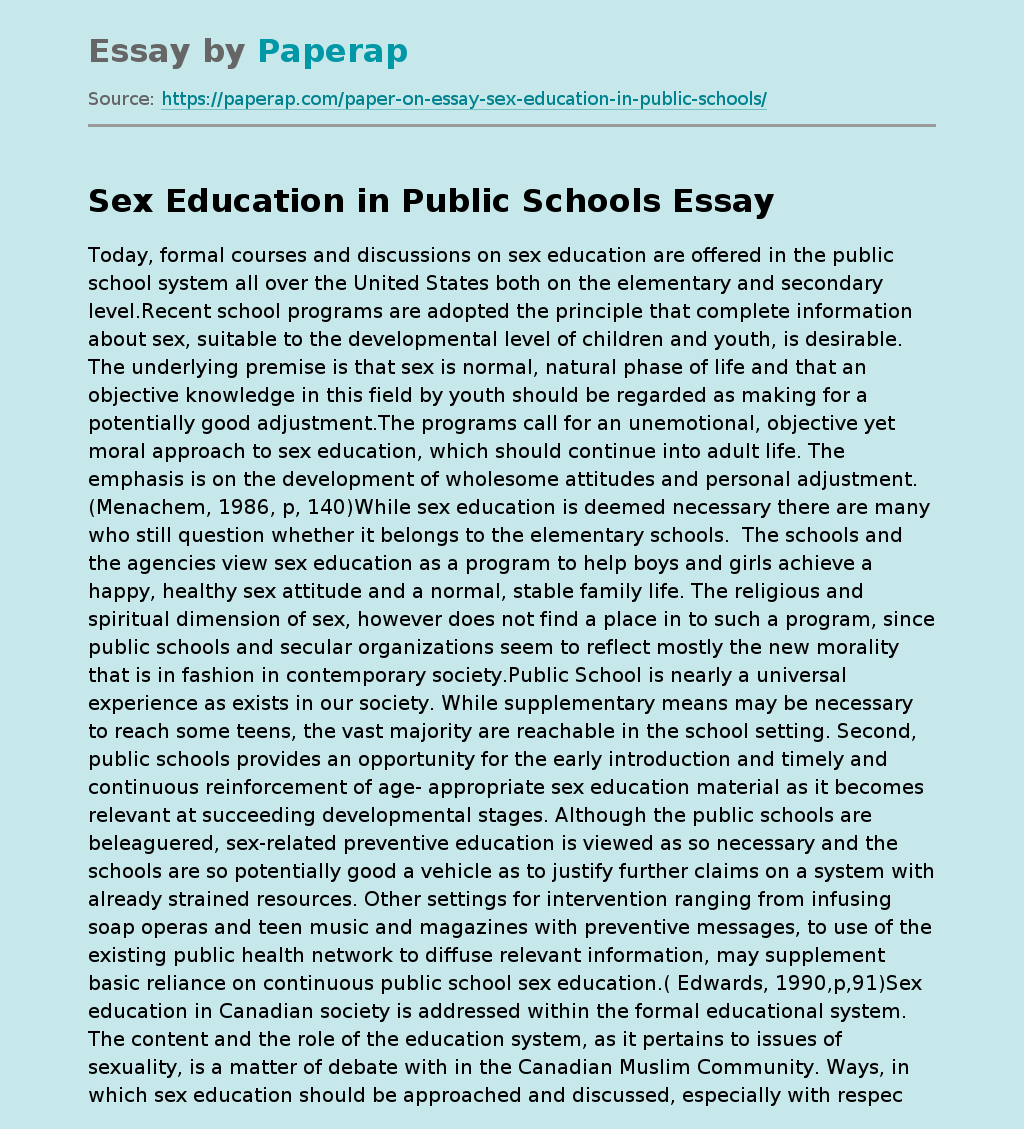Sex Education in Public Schools
Today, formal courses and discussions on sex education are offered in the public school system all over the United States both on the elementary and secondary level.Recent school programs are adopted the principle that complete information about sex, suitable to the developmental level of children and youth, is desirable. The underlying premise is that sex is normal, natural phase of life and that an objective knowledge in this field by youth should be regarded as making for a potentially good adjustment.
The programs call for an unemotional, objective yet moral approach to sex education, which should continue into adult life. The emphasis is on the development of wholesome attitudes and personal adjustment. (Menachem, 1986, p, 140) While sex education is deemed necessary there are many who still question whether it belongs to the elementary schools.
The schools and the agencies view sex education as a program to help boys and girls achieve a happy, healthy sex attitude and a normal, stable family life.
The religious and spiritual dimension of sex, however does not find a place in to such a program, since public schools and secular organizations seem to reflect mostly the new morality that is in fashion in contemporary society.Public School is nearly a universal experience as exists in our society. While supplementary means may be necessary to reach some teens, the vast majority are reachable in the school setting. Second, public schools provides an opportunity for the early introduction and timely and continuous reinforcement of age- appropriate sex education material as it becomes relevant at succeeding developmental stages.
Although the public schools are beleaguered, sex-related preventive education is viewed as so necessary and the schools are so potentially good a vehicle as to justify further claims on a system with already strained resources.
Other settings for intervention ranging from infusing soap operas and teen music and magazines with preventive messages, to use of the existing public health network to diffuse relevant information, may supplement basic reliance on continuous public school sex education.( Edwards, 1990,p,91) Sex education in Canadian society is addressed within the formal educational system. The content and the role of the education system, as it pertains to issues of sexuality, is a matter of debate with in the Canadian Muslim Community. Ways, in which sex education should be approached and discussed, especially with respect to Muslim women, is a point of particular contention in Canada.
Public Schools across Canada include sex education as part of their curriculum. Sex education courses are age specific and incorporate biological, moral and emotional dimensions. Boys and girls are taught the same material, including description of male and female anatomy; mental emotional and social aspects of pubescent change; the risks of unprotected sex; methods of contraception; varying conceptions of sexual orientation ( heterosexuality, homosexuality, bisexuality, trans-sexuality); and social attitudes toward sexuality, such as gender discrimination. Canadian public schools, although sensitive to the religious considerations of various traditions, limit discussions relating to religion and impart the same material to all students.While public schools provide sex education most Islamic schools in Canada, both weekend and full-time do not. As yet there are no standardized courses or materials available on sex education for Muslim in Canada. Some members of the Canadian Muslim Community fear that sex education will encourage sexual experimentation amongst Muslim youth.
Recently, however, Canadian Muslims have began to recognize that educating youth in matters related to sexuality is not the same as allowing sexual activity.( Afsanh & suad, 2007,p, 408)Canadian Muslim children are continuously exposed to media laden with sexual overtones, which many believe compromise their children’s Islamic values. The widespread perception regarding sexuality within the Muslim community maintains that sexual education is necessary to dispel messages communicated by the mass media. In this regard, sex education taught in public schools is considered insufficient, as it does not project Islamic perceptions of sexuality. From the Canadian Muslim perspective, matters concerning sex utility should be taught within the parameters of Islam.
Unfortunately, comprehensive sexuality education in the school is not a wide-spread phenomenon. U.S. society tends to devote much time and energy to coping with unwanted pregnancy, sexually transmitted diseases, and related problems once they have occurred, but very little to helping people prevent them in the first place. Some experts believe that only a minority of young people in the United States receive adequate sex education in public schools. Most are exposed to scattered presentations on basic reproductive facts- the “plumbing,” so to speak, of human sexuality. Since only a small number of parents educate their children about sex, the result is many sexually vulnerable citizens. (Jeffrey, 1986, p, 383) It is hard to understand why Americans fallen so short in this area since for years surveys have indicated that most Americans favor sex education in the public schools. Perhaps it is because there is so much disagreement about the content of sexuality education, how and by whom it should be taught, and whose values should be conveyed.
Sex Education in Public Schools. (2018, May 29). Retrieved from https://paperap.com/paper-on-essay-sex-education-in-public-schools/

